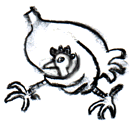Metaborgs? Corporations as organic/mechanical entities
Here is a quote from "New Rose Hotel" by William Gibson.
"Imagine an alien, Fox once said, who's come here to identify the planet's dominant form of intelligence. The alien has a look, then chooses. What do you think he picks? I probably shrugged.
The zaibatsus, Fox said, the multinationals. The blood of a zaibatsu is information, not people. The structure is independent of the individual lives that comprise it. Corporation as life form."
But also corporation as a unity of human and machine. If the corporation is considered as a single entity, combining the people that work there and the machines (often advanced technologies) that they work with, then I think we have a really big but diffuse cyborg on our hands. What do you think? I know I often think of multinationals as monstrous. Though containing human minds, they also act in ways that often seem inhuman. Powerful, enigmatic and frightening. Monsters of the new millenium.
"Imagine an alien, Fox once said, who's come here to identify the planet's dominant form of intelligence. The alien has a look, then chooses. What do you think he picks? I probably shrugged.
The zaibatsus, Fox said, the multinationals. The blood of a zaibatsu is information, not people. The structure is independent of the individual lives that comprise it. Corporation as life form."
But also corporation as a unity of human and machine. If the corporation is considered as a single entity, combining the people that work there and the machines (often advanced technologies) that they work with, then I think we have a really big but diffuse cyborg on our hands. What do you think? I know I often think of multinationals as monstrous. Though containing human minds, they also act in ways that often seem inhuman. Powerful, enigmatic and frightening. Monsters of the new millenium.



2 Comments:
Like the long tradition of the body politic analogy of government to body, there's also a long tradition of the factory as a machine and workers as mechanical parts in the machine. Often in dystopian literature the factory/corporation/society itself is depicted as a monster both monolithic and evil. The multinational is another version of the monstrous body. ("Corporation" as corpus).
There is also a tendency in the Industrial Age to depict the body itself as an industrial factory or office system: see the National Library of Medicine's Dream Anatomy: Dreaming the Industrial Body.
You might want to read Hobbes' Leviathan, which depicts the government, legal system, and commercial interactions as an enormous mechanistic body. In terms of the history of labour, Adam Smith's Wealth of Nations (1776) describes the ideal system to increase production through the division of labour in a pin factory: each man does one job repetitively thereby improving production (but also rendering the creative human into a mere mechanism):
"One man draws out the wire, another straights it, a fourth points it, a fifth grinds it at the top for receiving the head; to make the head requires two or three distinct operations; to put it on, is a particular business, to whiten the pins is another; it is even a trade by itself to put them in the paper; and the important business of making a pin is, in this manner, divided into about eighteen distinct operations..."
In The Theory of Moral Sentiments (1759) he writes of society as an industrial machine whose parts are like interacting mechanisms:
"The perfection of police, the extension of trade and manufactures, are noble and magnificent objects. The contemplation of them pleases us, and we are interested in whatever can tend to advance them. They make part of the great system of government, and the wheels of the political machine seem to move with more harmony and ease by means of them. We take pleasure in beholding the perfection of so beautiful and grand a system, and we are uneasy till we remove any obstruction that can in the least disturb or encumber the regularity of its motions."
There's lots we can talk about in terms of the technological society and corporation as monstrous entities. The Matrix does this too.
...of course, the body politic analogy at first rests on the notion of the state as organic, like bodies as microcosm of the universe; what happens when bodies become mechanistic structures, and states become mechanistic structures? What happens when bodies become electrochemical structures and machines become electronic structures? We get the analogy of the cyborg body politic, the Matrix as a monster out of control (or highly controlled but beyond human control), the machine as director of society....the body as irrelevant.
Post a Comment
<< Home